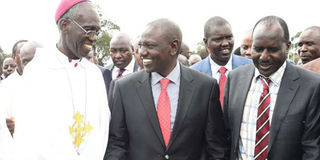Lobbying continues as Anglicans seek new leader

Deputy President William Ruto (center), ACK Archbishop Eliud Wabukala and Nandi Governor Cleophas Lagat during a thanksgiving ceremony of Agriculture Cabinet Secretary William Bett at Kapsabet Boys High School on January 31, 2016. Archbishop Wabukala's term ends in May, having attained the mandatory retirement age of 65. PHOTO | DPPS
What you need to know:
- Acknowledging that politicians have always sought to infiltrate the ACK election, Mumias Bishop Beneah Salala said looking up to God would be key to settling on the right person.
Intense lobbying is going on at the Anglican Church of Kenya (ACK) as delegates prepare to pick a new archbishop amid concerns that politicians from across the divide are keen to influence the process.
Archbishop Eliud Wabukala, the man about to hand over the baton to the next spiritual leader, told the Sunday Nation that aspirants have until April 1 to submit their nomination papers for consideration, setting the stage for what promises to be intense lobbying in the next few weeks.
“On April 4, the Chancellor will tell us who has applied and who has been cleared to run. After that, names of the candidates will be circulated in parishes for prayers paving way for the Electoral College on May 20,” the archbishop said.
Lawyer Tom Onyango, the Provincial Chancellor, is working with the transition team to ensure a smooth process.
Sources indicated that a series of consultative meetings are being held throughout the country as seven candidates who have so far shown interest in succeeding Archbishop Wabukala plot to attract support and regions seek to consolidate delegates.
One such forum will be held in western Kenya next week — either in Kisumu or Kakamega — as the regional dioceses seek to forge a united front.
In Mt Kenya, sources said there is a push to have two bishops drop their interest in the seat to avoid splitting the vote even as senior clerics from the region fight off suggestions that they should support a bishop from another part of the country.
There are also indications that Jubilee and Cord politicians have started “owning” prospective candidates with next year’s General Election raising the stakes in what should ordinarily have been an internal church affair.
In the past, prominent people such as former Attorney-General Charles Njonjo had an influence in the outcome.
For Njonjo, however, he may not have a sway in this year’s election because of age and other commitments.
By virtue of being the spokesman of ACK, which commands a following of about five million members, the top seat is prized for its influence.
NOT ELIGIBLE
Acknowledging that politicians have always sought to infiltrate the ACK election, Mumias Bishop Beneah Salala said looking up to God would be key to settling on the right person.
“It is my hope and prayer that we live above such (politics). Aware that the external forces would want to remotely commandeer the process, we must pray before submitting names of candidates to parishes,” he said.
Archbishop Wabukala expressed confidence that the church’s neutral stance on politics will not change even after he leaves office.
“There should be no cause for alarm. A competent transition team is firmly in charge,” he said.
Those said to have expressed interest in the position are Dr Christopher Ruto (Diocese of Eldoret), Bishop Moses Masaba (Mbeere), Bishop Julius Wanyoike (Thika), Bishop Joseph ole Sapit (Kericho), Bishop Joel Waweru (Nairobi), Bishop James Ochiel (South Nyanza), and Lawrence Dena of Malindi.
However, it is only after April 1 that the official list will be known.
Mt Kenya South Bishop Timothy Ranji, who had initially shown interest, appeared to have had a change of mind as he turns 60 this month, and will not be eligible when the process officially starts next month.
The ACK constitution sets the age limit at between 45 and 60 years.
Before formally handing over in July, Archbishop Wabukala, the former Bishop of Bungoma Diocese, will have taken his successor through a two-month orientation.
The church constitution does not allow him to vote.
Picked in 2009 after beating the Bishop of Maseno West Joseph Otieno Wasonga, the soft-spoken and towering archbishop’s term ends in May, having attained the mandatory retirement age of 65.
PREDECESSORS
As the 180 delegates drawn from 36 parishes will be picking the ACK head, the Anglican Church globally is undergoing turbulent times as liberal churches, mostly in North America, back homosexual priests and same-sex marriages but most African churches, led by Kenya and Nigeria, say this goes against Christian doctrines.
Archbishop Festo Olang’ was the first head of the church since the Province of East Africa was split into Kenya and Tanzania provinces in 1970.
His successor, Manasses Kuria, led between 1980 and 1994 followed by David Gitari (1997-2002) before the Bishop of Kitui, Benjamin Nzimbi, took over until 2009.
During the one-party Kanu rule, the Anglican Church was known for standing up to the government as it fought for civil liberties with bishops such as Henry Okullu and Alexander Muge speaking out openly.
Archbishop Gitari was also one of the most vocal heads of the church. But in recent years ACK and other mainstream churches have been accused of shying away from taking a firm stand on issues of national interest.




